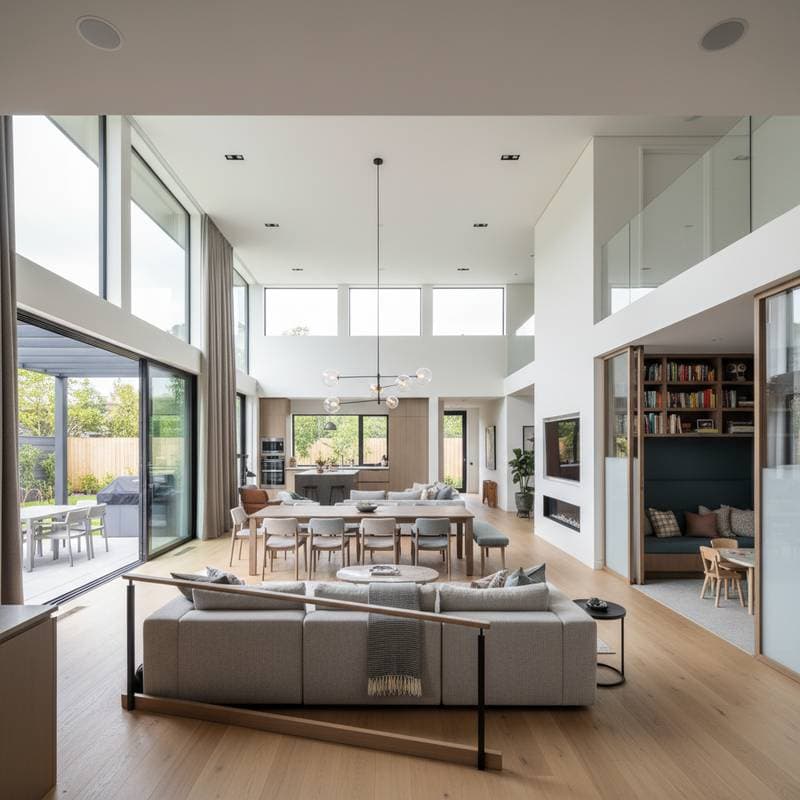The Overlooked Costs of 2025 Renovation Permits
Home renovation projects start with excitement and detailed plans, but permit expenses often catch owners off guard. These costs go beyond initial fees to include delays, compliance needs, and inspections that can alter project finances. Grasping these elements ensures better budgeting and fewer disruptions during home improvements.
What Permit Costs Actually Cover
A renovation permit serves as approval to alter a property, involving municipal reviews and compliance checks. It includes application fees, plan reviews, and inspections, but indirect costs like revisions or consultations add up quickly.
Costs differ by location and scope. For instance, a kitchen remodel might need electrical and plumbing permits, while an addition requires zoning and environmental reviews. Start by checking local fee schedules to estimate totals early.
Breaking Down Permit-Related Fees
Permit costs build through several stages. Here are the main categories:
- Base application fee: Covers initial plan submission.
- Plan review fee: Pays for code compliance evaluation by staff or engineers.
- Inspection fees: Applies per site visit to check progress.
- Revision fees: Arises from plan changes to meet requirements.
- Impact fees: Offsets infrastructure effects in some areas.
- Administrative surcharges: Handles processing or recordkeeping.
Individually minor, these can increase overall expenses by 20 to 40 percent.
Broader Financial Impacts
Permits affect more than budgets; they influence cash flow and timelines. Delays from approvals can raise labor costs as contractors wait or reschedule. Financing tied to milestones may pause, accruing extra interest on loans.
Unfinished permitted work might void insurance coverage. To mitigate, build buffer time into schedules and confirm lender requirements upfront.
Compliance Costs in Detail
Compliance demands often reveal hidden expenses. Building codes may require updates like new wiring, fire-rated walls, energy-efficient insulation, or water-saving fixtures. These changes demand redesigns and extra materials.
Anticipate by reviewing codes before design finalization. Consult a licensed professional to identify needs early and avoid mid-project surprises.
Inspection Challenges and Costs
Projects need multiple inspections, from foundation to final walkthrough. Issues like missed schedules lead to reinspection fees, while partial approvals require return visits.
Seasonal backlogs or weather can halt progress, adding labor downtime. Schedule inspections promptly and prepare sites fully to minimize repeats.
Permit Limits and Exclusions
Permits do not cover everything. Exemptions often include minor cosmetics, small sheds, or non-structural interiors without utilities.
Overstepping leads to fines or rework. Verify exemptions with your local department and secure separate permits for phased work.
How Costs Add Up
Overlooked items compound expenses:
- Document copies: Multiple printed sets or certifications.
- Expedited reviews: Double fees for faster processing.
- Professional consultations: Hourly rates for permit-driven changes.
- Utility adjustments: Extra permits for service modifications.
Track these in your budget to maintain control.
Permit Costs by Project Type
Costs vary by renovation scale. Use this table to gauge expectations:
| Project Type | Typical Permit Range | Inspection Requirements | Common Extra Costs | Risk Factors |
|---|---|---|---|---|
| Kitchen Remodel | $500 to $1,500 | Electrical, plumbing, final | Plan revisions, venting updates | Code upgrades mid-build |
| Room Addition | $1,000 to $3,000 | Foundation, framing, insulation, final | Engineering reviews | Lengthy approvals |
| Roof Replacement | $200 to $800 | One inspection | Disposal, stormwater compliance | Weather interruptions |
| Bathroom Upgrade | $400 to $1,200 | Plumbing, waterproofing | Fixture and ventilation compliance | Reinspection charges |
| Full Home Renovation | $2,000 to $5,000+ | Multiple phases | Impact fees, environmental checks | Administrative delays |
Larger projects amplify fees through more reviews.
Risks of Revocation
Approvals can revoke for violations like unapproved changes or missed inspections. This triggers fines, reapplication fees, and possible demolition.
Restarting adds contractor charges. Prevent by adhering strictly to terms and documenting all steps.
Long-Term Consequences
Poor permitting lowers resale value, as buyers and lenders demand proof. Unpermitted work invites retroactive fees or penalties.
Secure records post-project to protect future sales and coverage.
Framework for Permit Planning
Assess permits systematically:
- Outline objectives: Pinpoint what needs approval.
- Gather estimates: Get itemized quotes from departments and contractors.
- Check compliance: Spot code-related upgrades.
- Plan inspections: Count visits and add reinspection buffers.
- Factor delays: Include interest or living costs from extensions.
- Total ownership costs: Add fees, indirects, and resale effects.
This method turns permitting into a strategic tool.
Strategies to Minimize Risks
Reduce surprises with these steps:
- Select licensed experts: Ensure familiarity with local codes.
- Secure fee details: Confirm surcharges in writing.
- Organize documents: Retain all approvals and reports.
- Submit early: Beat seasonal rushes.
- Prep for inspections: Complete work before calls.
These practices streamline projects and cut costs.
Key Terms in Permit Documents
Owners bear compliance responsibility. Review for expiration rules, violation liabilities, on-site posting, modification processes, and dispute options.
Some areas mandate insurance or bonds, so factor those in.
Steering Clear of Errors
Avoid pitfalls by:
- Seeking pre-design consultations on codes.
- Allocating 10-15% contingency for permits.
- Monitoring milestones with records.
- Verifying final closeout procedures.
Informed Renovation Choices
Permits uphold safety but demand careful financial planning. Scrutinize fees, timelines, and requirements from the start. This preparation yields smoother renovations and preserved budgets.



